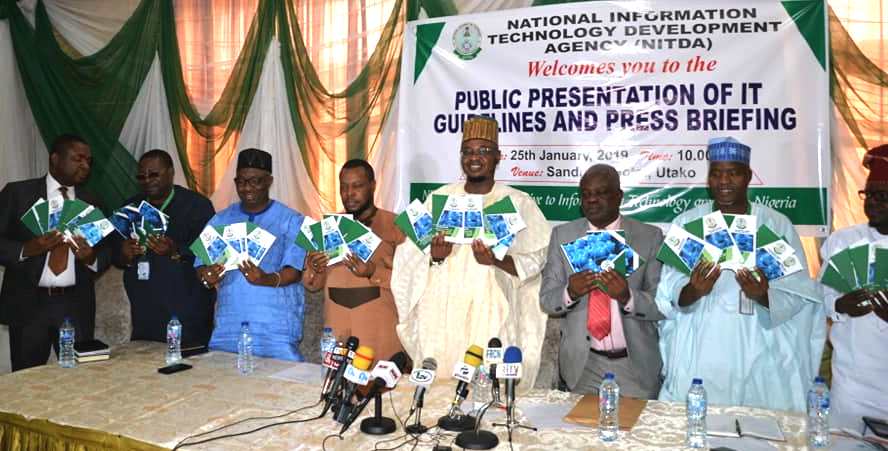The National Information Technology Development Agency (NITDA) has unveiled five Information Technology (IT) Guidelines and regulatory frameworks to guide the deployment of IT, particularly in public sector; data harnessing and protection, social media usage in government ministries, departments and agencies (MDAs); and in all, technology processes to aiding the ease of doing business in Nigeria.
They guidelines include:
The Rulemaking Process Regulation of NITDA
The Nigerian Data Protection Regulation
Guideline for IT Clearance
Guidelines for Public Internet Access
Framework for Use of Social Media in Public Institutions
https://www.facebook.com/nitda.nig/videos/245352536399234/
The new guidelines will further enable the NITDA to regulate the use of IT and operations of social media in public spaces as well as provide a working framework to guide the overall deployment and usage of IT across the country, said Director General of NITDA, Dr. Isa Ali Ibrahim Pantami while unveiling the new guidelines in Abuja.
According to Pantami, the said guidelines and frameworks are the outcome of painstaking research and wide consultations to properly serve what direction government is headed with IT development in the country.
“It will also allow engagement to help the public to understand all processes involved in the issuance of regulatory documents by the agency…. NITDA from now will be generally bound by the Rulemaking Process as an integral part of the operations of the agency.”Pantami said that the Nigeria Data Protection Regulation was in accordance with Section 6 of NITDA Act 2007,” added Pantami.
The NITDA’s boss said while there had been circulars on Guidelines for Clearance of Information Technology Projects, the challenge was enforcement until recent times when NITDA started a regime of strict compliance by MDAs in line with the IT agency’s mandate as a regulatory institution.
“This guideline is for public institutions which include MDAs, federal institutions, Federal Government-owned companies and it is to guide federal institutions in procuring IT goods and services.
“It will ensure that government money is not mismanaged in the execution of IT projects, harmonisation in the execution of projects and also ensure that institutions carrying out IT projects have the capacity,” said Pantami while adding that: “this is the first time NITDA is rolling out Rulemaking Process to allow the public to know the steps for guidelines and regulatory framework.”
Pantami said the guide provide a proper basis upon which the agency can now best engage MDAs and other stakeholders on IT regulation and deployment. His words: “On assumption of office, we realized that the agency did not have any instrument that stipulates a clear process for rule making for issuance of Frameworks, Standards and Guidelines.
‘‘This effort is to ensure a defined, best practice approach to rule making is utilized by NITDA to develop sound instruments for regulation of IT. We also anticipate that the public will now understand all the processes involved in issuance of regulatory documents by the agency. This policy also creates platforms for public engagement in the issuance of regulatory documents by the Agency.
‘‘From this point henceforth, NITDA will be generally bound by the Rulemaking Process as an integral part of the operations of the agency.
‘‘These efforts resulted in an exceptional increase in the patronage of locally assembled devices. Records have shown that in 2015, Indigenous Original Equipment Manufacturers (OEMs) sold 98,224 devices in 2015, 154,424 in 2016 and 355,647 in 2017.’’
Also, the guideline on public internet is to protect citizens privacy as free wifi increasingly gain grounds across the country, said Pantami.
“The Frameworks and Guidelines for Public Internet Access (PIA) provides guidelines for providers of public internet access services to maintain appropriate systems and policies to protect Nigerians who use these services.
“Free Wi-Fi is commendable but there will be abuse if not regulated because of security reasons. We don’t want the security of the nation to be compromised.”
He said the Use of Social Media Platforms in Public Institutions would ensure public institutions had processes in the creation of social media accounts. According to him, important information and records are lost when handlers of platforms are changed due to the absence of clear policies by federal institutions.
Such situation constituted risks to information management and public accountability, said the NITDA’s boss adding that the agency would continue to monitor social media platforms of federal and public institutions for consistency.

































